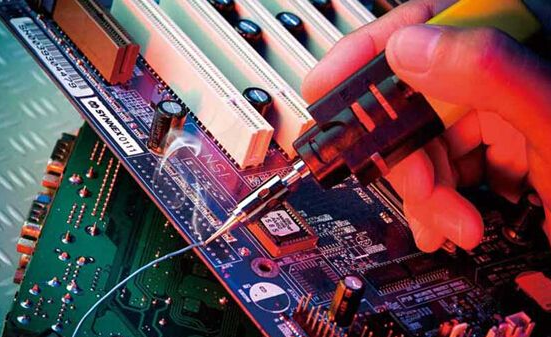Interconnection Method of Circuit Board
As a part of the whole machine, the circuit board usually cannot constitute an electronic product, and there must be external connection problems. For example, electrical connections are required between circuit boards, between circuit boards and off-board components, and between circuit boards and equipment panels. Choosing the best matching connection for reliability, manufacturability and economy is one of the important steps in circuit board design. There are many external connection methods, and it is necessary to flexibly choose according to different characteristics.

Circuit Board Interconnection Method 1: Soldering Method
The advantages of this connection method are simple, low cost and high reliability, which can avoid failures caused by poor contact. The disadvantage is that it is not easy to exchange and maintain. This method is usually suitable for the case of few external leads.
1. PCB wire soldering
This method does not require any connectors, as long as the external connection points on the PCB circuit board and the components or other parts on the circuit board are directly soldered with wires. For example, speakers in the radio, battery box, etc.
Attention should be paid to the interconnection welding of the circuit board:
(1) Welding wire pads should be placed as far as possible on the edge of the circuit board and arranged in a uniform size to facilitate welding and maintenance.
(2) In order to improve the mechanical strength of the wire connection and avoid pulling the pad or printed wire due to the wire, a hole should be drilled near the solder joint on the circuit board. This is to make the wire pass through the through hole from the soldering surface of the circuit board, and then insert the pad hole from the surface of the component for soldering.
(3) Arrange or bundle the wires neatly and fix them to the board with wire clips or other fasteners to prevent the wires from breaking due to movement.
2. PCB Cable Welding
The cable connection is used between the two circuit boards, which is reliable and not prone to connection errors, and the relative position of the two circuit boards is not limited.
This method directly solders between circuit boards and is usually used to connect two circuit boards at a 90-degree angle. After connection, it becomes the entire PCB circuit board assembly.
Circuit Board Interconnection Method 2: Plug Connector Connection
In more complicated instruments and equipment, the connection mode of the plug connector is often used. This "building block" structure not only ensures the mass production quality of the product, reduces the system cost, but also provides convenience for debugging and maintenance. When the equipment fails, the maintenance personnel does not need to check the components (that is, check the cause of the failure, trace the root cause to the specific components. This work takes a lot of time), as long as it is judged which board is abnormal, it can be immediately carry out the replacement, eliminate the fault in the shortest time, shorten the downtime, and improve the utilization rate of the equipment. The replaced circuit board can be repaired in sufficient time and used as a spare part after repair.
1. Circuit Board Socket
This connection is often used in more complex instruments and equipment. This method is to make a printed plug from the edge of the circuit board. The plug part is designed according to the size of the socket, the number of contacts, the distance of the contacts, the location of the positioning hole, etc., so as to match it with the socket of the dedicated PCB circuit board.
When making a circuit board, the plug part needs to be gold-plated to improve wear resistance and reduce contact resistance. The method has simple assembly, good interchangeability and good maintenance performance, and is suitable for standardized mass production. The disadvantage is that the cost of the circuit board increases, and the manufacturing accuracy and process requirements of the circuit board are relatively high. The reliability is slightly poor, and the contact is often poor due to oxidation of the plug part or aging of the socket spring. In order to improve the reliability of the external connection, the same lead-out wire is usually led out in parallel through the contacts on the same side or both sides of the circuit board.
2. Standard Pin Connection
This method can be used for external connection of circuit boards, especially in small instruments, usually using pin connection. The two circuit boards are connected by standard pins. The two circuit boards are usually parallel or vertical, which is easy for mass production.
HOYOGO is an international, professional, reliable PCB manufacturer. We have 2 production bases with a monthly production capacity of 500,000 square meters. One-stop PCB product supply and solution. And HOYOGO have a management team with 25 years of average industry experience and reliable quality assurance.
评论
发表评论